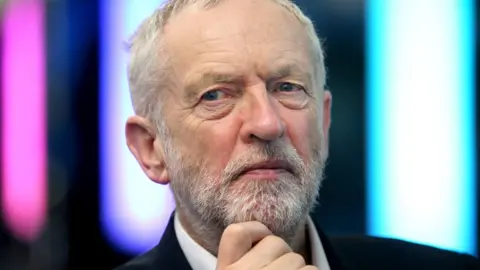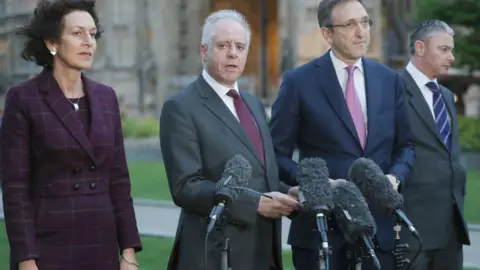Labour vows to settle anti-Semitism complaints by July
Labour is promising to settle the "vast majority" of the outstanding cases of alleged anti-Semitism within the party by the end of July.
Jeremy Corbyn said dealing with complaints swiftly and fairly was a top priority for the new general secretary.
The Labour leader met members of the Jewish Leadership Council and the Board of Deputies of British Jews on Tuesday.
They said the talks were a "disappointing, missed opportunity" and did not agree a minimum plan of action.
Mr Corbyn has apologised for anti-Semitism - prejudice against Jewish people - in his party and said he was "absolutely committed" to rooting it out.
Sources close to the Labour leadership say Mr Corbyn agreed to speed up disciplinary procedures, but not to fixed timescales which might leave the party open to legal challenge.
Mr Corbyn said his meeting with the groups had been "positive and constructive", but Jonathan Arkush from the Board of Deputies disagreed and said "there were no actions to go with the words".
Jonathan Goldstein, of the Jewish Leadership Council, said Mr Corbyn "engages in conversation until you ask him to do something".
Mr Goldstein told BBC Radio 4's Today programme: "When you ask him to do something he has this habit of staring and just shrugging."
He said Mr Corbyn seemed reluctant to "call out" people he knows and did not want to "own the words" around the anti-Semitism claims.
Mr Goldstein said: "Leadership starts from the top and we are asking Mr Corbyn to take behavioural change and leadership seriously.
"He could change the atmosphere in a moment."
Barry Gardiner, the shadow international trade minister, told Today that Mr Corbyn had "acknowledged and apologised for" the time taken to address the issues.
He said: "It's actions that matter and actions are being taken by the party to make sure this is dealt with."
 PA
PALabour has been dogged by a series of incidents including criticism last month of Mr Corbyn's comments on an allegedly anti-Semitic mural in 2012 and the party's suspension of former London Mayor Ken Livingstone over his claim that Adolf Hitler had supported Zionism in the 1930s.
The Labour leader has been accused of not taking the issue seriously enough by Jewish groups and some of his own MPs, who took part in a protest in Parliament Square last month.
On Thursday last week, MPs shared their own experiences of anti-Semitic threats in the House of Commons.

Analysis
By Iain Watson, BBC political correspondent
Accusations that anti-Semitism wasn't being taken seriously enough by Labour are proving politically toxic in two ways.
First, they undermine Labour's "brand" - a party that stands for equal rights and anti-racism.
And secondly, the effort to detoxify the issue has arguably diverted the party's leadership from the forthcoming local election contests.
So it would have been helpful if the Jewish groups had suggested that progress had been made since their demonstration in Parliament Square, which some of Jeremy Corbyn's own MPs joined a month ago.
While they did welcome Mr Corbyn's words on anti-Semitism - and his denunciation of those who said the problem had been invented or exaggerated - their verdict on action, or lack of it, means that the issue remains a potent force in the hands of the Labour leader's internal and external opponents.
Perhaps the most positive interpretation is that there was a disagreement over detail and not a fundamental division in outlook.
That's certainly how sources close to the Labour leadership would like it to be seen.

The Jewish Leadership Council and Board of Deputies wrote to Mr Corbyn following last month's demonstration to suggest "areas of action".
After meeting for more than two hours, the organisations said in a statement: "We are disappointed that Mr Corbyn's proposals fell short of the minimum level of action which our letter suggested.
 PA
PA"Words in letters and newspaper articles will never be enough. We welcome the fact that Mr Corbyn's words have changed but it is action by which the Jewish community will judge him and the Labour Party."
They said the following suggested points of action were rejected:
- A fixed timetable to deal with anti-Semitism cases
- Expedite the long-standing cases involving Mr Livingstone and suspended party activist Jackie Walker
- No MP should share a platform with somebody expelled or suspended for anti-Semitism
- Adopt in full the International Holocaust Remembrance Alliance (IHRA) definition of anti-Semitism
- Transparent oversight of the disciplinary process
According to the MP Louise Ellman, who is president of the Jewish Labour Movement, there is a backlog of around 80 serious complaints of anti-Semitism.
It is understood Mr Livingstone's case is among those which will be dealt with by July.
But the Jewish groups accused Mr Corbyn of hiding behind process after they were told he had no power personally to expel Mr Livingstone.
Jewish Voice for Labour, which has accused Mr Corbyn's opponents of using the issue to undermine the leader, said there had been too little focus in the media and Westminster on anti-Semitism on the right of politics.
In an article for the group's website, academic and activist Justin Schlosberg said he had asked other Jewish groups to endorse a statement criticising what he said were the Conservatives' "formal and informal links" to European political groups with a history of anti-Semitism and they had all declined.
